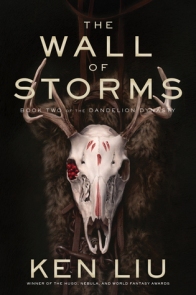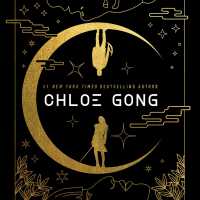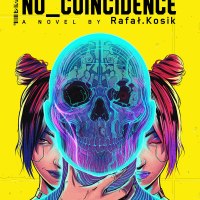Book Review: The Wall of Storms by Ken Liu
I received a review copy from the publisher. This does not affect the contents of my review and all opinions are my own.
Mogsy’s Rating: 5 of 5 stars
Genre: Fantasy
Series: Book 2 of The Dandelion Dynasty
Publisher: Saga Press (October 4, 2016)
Length: 880 pages
Author Information: Website | Twitter
“Not all wars are fought with swords and spears, and not all foes are found on the battlefield. The times are changing, brother, and we must change along with them.”
I think it’s safe to say, if you loved The Grace of Kings, Ken Liu’s phenomenal debut that took the genre by storm last year, you will also be blown away by its magnificent sequel. Liu’s prose is as beautiful and lyrically expressive as ever as we dive once more into this scintillating world where history and mythology collide. You will again be met with epic battles and court intrigue, the triumphs of victory and heartaches of defeat, the timeless fiery passions and ambitions of people touched by fate.
And yet, like the above quote so poignantly suggests, the winds of change are sweeping across the realm, and The Wall of Storms is a story of transformation and adaptation. The empire of Dara still faces challenges but now they come in other guises, and those who want to survive will need to learn to understand the forces they are up against. Conflicts come from both within and without, and yet sometimes your foes are not flesh and blood but philosophies and concepts.
Hence the war continues, even though the long uprising is over and Kuni Garu now sits on Dara’s throne as emperor. In the first part of the novel, we look at how the clashes have persisted, though now the focus has shifted from the arts of war to the scholarly ways of learning. We also have another generation enter the equation. The book begins as Emperor Kuni’s children—Timu, Phyro, Thera, and Fara—sneak out of the palace to enjoy a day of listening to stories in a local tavern. Through the storyteller, we are briefly brought up to speed on the tumultuous relationship between Kuni Garu and the now deceased legendary warlord Mata Zyndu, a subject which was a major part of The Grace of Kings. All hell breaks loose, however, when a disgruntled patron in the crowd accuses the storyteller of sedition for glorifying Zyndu, the Emperor’s one-time friend turned bitter rival. Thankfully, someone else steps in to defend the storyteller and tavern-goers—a character who is new to the series but whom nonetheless plays a very important role in this novel.
Zomi Kidosu is her name, and much of The Wall of Storms is dedicated to the story of her life. The first half of this book tells of Zomi growing up in a poor fishing village, scarred and crippled from an accident which left her with little prospects for the future. But fate leads her to a chance encounter with Luan Zya, the wandering philosopher and former adviser to the emperor. Recognizing Zomi’s intelligence and latent potential, Luan decides to take the girl on as a student, and thus begins one of the most beautiful and heartfelt friendships I have ever read.
Zomi’s efforts eventually lead her to sit the Imperial Examinations. Once again, we can see how history has inspired Ken Liu’s writing and the world of The Dandelion Dynasty. It was a delightful surprise when I saw that the author had taken a fascinating piece of history from ancient China—the real Imperial examination system—and mirrored it for his purposes here. Intended as a way to select the best candidates for civil service, the examinations were indeed as tough and exclusive as Liu portrayed them in this book. Such exams helped shape ancient China’s history, and over time became one reason for the shift from militaristic policies to more scholarly and bureaucratic ones in the early dynasties—a shift that is happening in Dara as well, as this sequel hints. The examinations also encouraged cultural unity, and that really fits one of the key themes in both The Grace of Kings and The Wall of Storms: the idea that there’s more than one way to win a war and conquer your vassals. Again, we talk about change in this sequel—like putting down swords and picking up pens instead.
But if you think this book is going to be dominated by talk of the scholarly pursuits, you are also mistaken. The second half of the book goes back to all out warfare as a rebellion threatens the stability of Dara. In addition to that, a mysterious force also invades from beyond the wall of storms. This is where Princess Thera steps up and becomes an impressive figure in her own right, pushing back against her detractors who are practically in fits at the absurd idea that a mere woman can hold and wield power. These attitudes are summarily smacked down as the sexist, stupid views they are as Thera proves why she is regarded by her father as the strongest and wisest of his children.
Indeed, in this sequel, the women steal the show. I think those who noted the relative absence of major female characters in the previous book will be happy to see that this is not the case here. Between Zomi and Thera, we have two very influential women rocking these pages, but there’s also the behind-the-scenes conflict at court between Empress Jia and consort Risana. While their war of wills involves more subtle attacks rather than overt fighting, it very much parallels the battle of ideologies we saw between Kuni and Mata in the first book. Yet another example of The Wall of Storms displaying familiar themes, but coming at them with a different approach.
Still, the evolution and transformation of this series notwithstanding, if you didn’t take to the style of The Grace of Kings, you’ll probably experience the same issues with this sequel. Liu’s writing is elegant and rich, and like I said in my review of the first book, his evocative prose is meant to be savored. Together with the mini-tales and historical asides he injects into the main plot though, this can sometimes slow the pacing and weigh down the overall story. But if, like me, you were enchanted with this book’s predecessor and enjoyed every moment of its epic, far-reaching narrative, you will love The Wall of Storms just as much if not more.
I’ve said it before and I’ll say it again: whether he’s penning short stories or 800+ page novels, Ken Liu’s writing is so inspiring. If you are a fan of epic fantasy and you haven’t read The Grace of Kings yet, you are missing out on some of the best writing and storytelling this genre has to offer. Now having finished The Wall of Storms, this sequel only served to cement this series in my mind as a true work of art.
![]()
![]()
More on The BiblioSanctum:
Review of The Way of Kings (Book 1)
Interview with Ken Liu













Great review, I loved this book but couldn’t finish the first!😂
LikeLike
I loved the first book, but yeah I did think this smoothed out some of the issues, like pacing and characters.
LikeLiked by 1 person
I guess I really should try this series
LikeLike
Definitely.
LikeLike
Definitely a series I want to read, some day when an 800 page book will work with my lifestyle, lol.
LikeLike
I know, I have several other books on my shelf that are like that – that I really want to read, but the page count is just too intimidating (though usually, that’s when I tell myself, “I can audiobook it”)! 🙂 I hope you do get to give this one a try some day!
LikeLike
Pingback: Mogsy’s Bookshelf Roundup: Stacking the Shelves & Recent Reads | The BiblioSanctum
This sounds fantastic! I’m glad to see that the second book in the series lived up to your expectations. I still need to get around to reading the first one. I love that quote you started the review with too.
LikeLike
I don’t usually quote in my reviews, but when I read that one, it just struck me as perfect and I knew I had to use it!
LikeLiked by 1 person